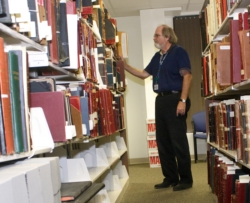Archdiocesan archivist honored by national society
Over the last decade, the Archdiocese of Boston has been through a whirlwind of turbulence -- the clergy sexual abuse scandal, parish closures and mergers, the sale of archdiocesan property, and the closing of the chancery and subsequent opening of a new Pastoral Center.
As archivist and records manager for the archdiocese, Robert Johnson-Lally played a vital, if mostly unseen, role in all of those -- showing attorneys the records they needed to properly litigate the abuse cases, receiving and assimilating new records into the archdiocesan archives, and devising a strategy to ensure a smooth and precise relocation. All the while, he still had to make sure historians, genealogists, and other members of the public found the information they were seeking.
Not only did he help the archdiocese through its recent changes, but in November 2006 he volunteered with the Diocese of New Orleans to assess the damage done by Hurricane Katrina to religious artifacts in the area.
It was these recent achievements that earned him the 2009 Sister M. Claude Lane Award, given by the Society of American Archivists in conjunction with the Society of Southwest Archivists to honor exemplary work in the field of religious archives.
Mark Duffy, Director of the Archives of the Episcopal Church in Austin, Texas, praised his work with the archdiocese in his nomination letter.
“One mark of a good organizational archivist is being able to think strategically and respond keenly to the opportunities of the changing environmental conditions and resources. This use of foresight as environmental scanning is an aspect of Robert’s management style at the Archdiocese of Boston,” Duffy wrote. “It has led his agency through some extremely difficult times for the organization with a minimum impact on the archives and its services.”
It has never been just another day at the office for Johnson-Lally over the last few years.
“If it weren’t for the difficulties of a couple of years ago, and the actual move, this would be an ordinary job,” Johnson-Lally said. “Those two events were extraordinary and outstanding.”
His staff assisted archdiocesan attorneys with combing through various clerical records and administrative correspondence, as well as explaining how records were kept. In some cases, Johnson-Lally attested that the archive did not contain certain information.
“We were the intermediaries,” Johnson-Lally said. “We were asked by the administration to look for things.”
Just over one year ago, Johnson-Lally guided the relocation of the archives to the new Pastoral Center in Braintree.
“We probably had the biggest office in terms of the amount of material that had to be moved,” Johnson-Lally recalled.
Prior to moving, Johnson-Lally and his staff assessed the records, detailed what had to be moved, and developed a relocation strategy.
“I don’t think anyone really knew what this move was going to be like,” Johnson-Lally recalled.
In just under two weeks, Johnson-Lally and his assistant transferred the archives, coordinating the removal of items from the shelves in Brighton and reshelving them in Braintree. The team had to decide where the records were to be placed -- in the reading room, stacks, vaults, or off-site storage area.
He recalled as many as two tractor trailers per day arriving full of archives materials.
“As far as I know, nothing was lost,” Johnson-Lally said. “It’s inevitable in a move like this that some things come out of order. It went remarkably well, considering the amount of material there was and the amount of people moving it.”
Always a work in progress, he has been spending the last year “refining the organization of records” -- deciding where specific records will go.
With the closings of several parishes in recent years, the archives have witnessed an influx of sacramental records, though most records were transferred to other parishes.
“Mr. Johnson-Lally has shepherded the discovery process of significant diocesan records during an unprecedented time of public and legal interest and involvement in religious records, and has provided transition services to closing parishes and schools and their records,” said Christine Taylor, JCL, former chancellor and archivist for the Archdiocese of Seattle, in her nomination letter.
Following Hurricane Katrina, Johnson-Lally journeyed to New Orleans with seven other archivists from around the country to assist approximately six churches with recovering artifacts. The team photographed the surviving artifacts, detailed the condition of each, and arranged to have them moved to safety.
“It was a sobering sight to see this sort of thing happen,” Johnson-Lally said.
Diocesan authorities in New Orleans then decided which items were damaged or restorable.
All the while, he has been the individual to whom the public goes when in need of historical, genealogical, and sacramental records, as well as any other types of information the archives can provide. In a quiet, calm, and unassuming way, Johnson-Lally enables the archdiocese and its faithful to obtain needed information, while meeting the challenges of recent times with grace and poise.
Johnson-Lally has 30 years of experience in records management. He began his professional career at Tufts University as an associate university archivist, curator of special collections, and preservation officer, and was promoted to university archivist in 1989. Following that, he directed a cataloguing project for the Maine Historical Society. He began his current position with the archdiocese in 1994.
He has also held various consultant positions in the past, including at the Fletcher School of Law and Diplomacy at Tufts, the Rhode Island Jewish Historical Association, and the City of Lowell. Currently, he serves on the Library and Archives Board for the Episcopal Diocese of Massachusetts.
He earned his bachelor’s degree from the University of Massachusetts-Boston in 1978 and a Master of Arts degree from Case Western Reserve University in 1979.
Johnson-Lally has served on many committees and held leadership roles in various professional organizations such as the New England Archivists, Society of American Archivists, and the Association of Catholic Diocesan Archivists.



















